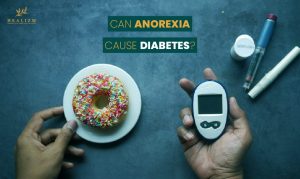
Can anorexia cause diabetes? Anorexia itself does not directly cause diabetes but there is a close relationship between eating disorders and diabetes.
An unbalanced diet and inconsistent blood sugar levels can eventually lead to the development of type 1 diabetes.
It can impact someone’s physical health by affecting blood sugar, insulin levels and production.
Nevertheless, Type 2 diabetes has been linked to several eating disorders, including bulimia nervosa (BN) and binge eating disorder (BED).
If you observe that your anorexia is associated with diabetes and another mental health issue, please visit Healizm.
What Is Hypoglycemia Anorexia?
Hypoglycemia is a medical term that describes low blood glucose levels.
In effect, a healthy body will metabolize what you eat and convert carbohydrates into sugars, which are absorbed into your bloodstream and form a critical nutritional element – glucose – required by your cells.
Anorexia depletes the liver of the chemical building blocks required to produce glucose, as well as glycogen, which is essential for maintaining proper blood sugar levels.
Furthermore, Anorexia nervosa (AN) is a mutual eating disorder that can have serious effects on a person’s mental, physical, and sensitive comfort.
Contact us to get the best possible guidance.
Can Anorexia Cause Hypoglycemia?
Yes, it can cause hypoglycemia. Anorexia can indirectly cause hypoglycemia.
Hypoglycemia is the medical term for having low blood sugar.
It is not a disease or disorder but rather a symptom of a deeper problem in the body.
One of the most common symptoms of anorexia involves not eating, which can cause blood sugar levels to drop dramatically.
Anorexia and Diabetes
An unbalanced diet and fluctuating blood sugar levels can contribute to the development of type 1 diabetes.
An appropriate pancreas is required to maintain blood sugar levels.
While rare, anorexics may experience hypoglycemia, which is common among diabetics.
Having anorexia with diabetes may increase the risk of complications associated with diabetes; conversely, having diabetes can also increase the risk of developing anorexia.
According to the American Diabetes Association, women with diabetes are more likely to develop an eating disorder such as anorexia than women without diabetes.
Stages of Anorexia
The stages of anorexia include the following:
- Awareness: At this stage, people become aware of their problematic eating behaviors and acknowledge that they may have anorexia.
- In the Contemplation stage, individuals examine the advantages and disadvantages of getting well and think of how they can find assistance.
- At this point, people begin to take steps leading to recovery, such as going for treatment, communicating with doctors and creating a support network.
- You’ll be treated by doctors in an active way to change things in your overall health.
- The final phase focuses on long-term recovery where you build a good relationship with food and learn ways to avoid future setbacks.
Orthorexia vs Anorexia
| Orthorexia | Anorexia |
| Obsession with healthy eating | Fears of being overweight or gaining weight |
| Quality of food | Calorie and food quantity restriction |
| Not intense concerns about body shape and weight | Intense fear of weight gain; distorted body image |
| Weight is not a marker for diagnosis | Significantly low body weight required for diagnosis |
Final Thoughts
Can anorexia cause diabetes? People with anorexia can experience low blood sugar levels, particularly in cases where their body mass index falls below 15.
Internal tube feeding, dextrose injections, and meal-based management are all options for treating anorexia-related hypoglycemia.
If you believe you have low blood sugar, consuming a small amount of easily absorbable carbohydrates (such as 1/2 cup of fruit juice) can help raise it.
FAQs
Can you get diabetes from not eating enough?
No, not eating enough does not directly cause diabetes but regularly skipping meals can have harmful effects for people with type 2 diabetes.
What is the most serious consequence of anorexia nervosa?
The most severe consequence of anorexia nervosa is its risk of death.
Can eating too little cause high blood sugar?
Not eating breakfast can raise blood sugar levels after lunch and dinner.
What are the major causes of diabetes?
You are more likely to develop type 2 diabetes if you are not physically active and are overweight or have obesity.
